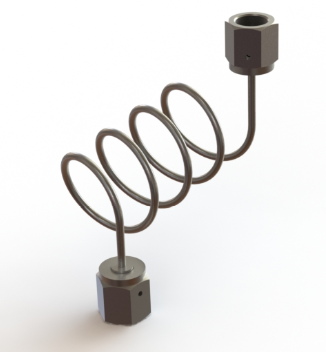Overview and Objective
Orbital Fabrications was approached by a specialist aerospace company attempting to develop an innovative propulsion system. The system is exposed to extremely high temperatures and pressures at high speeds which requires the use of novel propulsion, compression and heat exchanger technologies and highly exotic and challenging engineering super-alloys and materials.
A key sub-assembly within the propulsion system is the engine. The client required 25 inlet pigtail and 24 outlet pigtail components to be manufactured in a highly repeatable manner and to be made from the engineering super-alloy Inconel.
The component had a challenging non-concentric bend and non-uniform datum points for dimensional points of reference. Furthermore, the nozzle needed to be joined to the tube through a fully penetrating but zero evidence orbital weld. The company had approached one of Orbital’s competitors to initially produce the components. However, that company was unable to produce them with the repeatability and precision required for the application. Consequently, Orbital sought to develop a proprietary manufacturing process to produce the component in a repeatable manner for the batch production volume required.
The Challenge
The aerospace client is at the forefront of innovation relating to the component design, which has been deemed a trade secret and is entirely proprietary to the client. Requiring expert technical capability and knowledge, the client contacted Orbital Fabrications to both manufacture the components and to define and realise a viable manufacturing process to produce the component at the required production volumes. Although Orbital has had prior experience with Inconel, the component geometry was highly complex with non-uniform reference points and therefore a bespoke development project was necessary to meet the client’s exact specifications.
Scientific and Technological Advance
The team at Orbital Fabrications sought to extend its overall knowledge and capability in the field of precision engineering and manufacturing as applied to the realisation of novel inlet and outlet components for a High-Tech engine. This would be achieved through the adaptation of existing technology into a new application where this adapting was not readily deducible. Orbital sought to gain the requisite knowledge and technical capability needed to meet the client’s specific requirements.
Challenging Material
Due to the hostile operating conditions inside the propulsion system, the component was to be made from an Inconel alloy. Inconel is a specialist austenitic nickel-chromium super-alloy that has been developed through solid solution hardening to change the metallic structure of the alloy. This enables high strength characteristics at high temperatures and pressures where most stainless steels would fail due to creep fatigue. The treatments of the metal, and its sintered structure, make the alloy extremely challenging to machine, cold work, and weld. In particular, it is extremely challenging to create stable welds as micro-cracks can occur within the heat zone of the weld. In addition, the alloy also exhibits rapid work hardening that make machining and cold forming difficult – both processes were required for this component. Due to the significant costs and the long lead time of the alloy, it was critical that Orbital undertook a feasibility and learning phase using stainless steel to identify a manufacturing process that could produce each component without incurring significant scrap.
The Orbital Solution
Orbital began the project by first reviewing the engineering drawing sheets sent by the client. Significant critical information was missing from the drawings. This resulted in the design team at Orbital attending several technical workshops with the client to understand critical and noncritical features and dimensions of both the inlet and outlet components.
Due to the cost and lead time associated with Inconel, it was not viable to undertake exploratory feasibility work using the alloy. Instead, Orbital sought to gain understanding into viable manufacturing processes for each component using Stainless Steel.
Different teams began machining, bending, and welding processes in an attempt to create a repeatable and reliable process. Processes were reviewed and refined over time to improve and refine. This resulted in a weld procedure specification being defined for the inlet nozzle weld.
It was necessary for Orbital to design and build a suite of bespoke manufacturing and inspection jigs to assist in the manufacture of the components. This enabled the team to undertake repeatable processes against the non-uniform reference datum. A set of inspection jigs were also manufactured for the client so that user acceptance tests could be performed prior to installation on the propulsion system.
Orbital was able to manufacture the components to a high degree of repeatability when the components were manufactured from stainless steel and therefore moved to Inconel. Changes in material behaviour were observed during both cold forming and welding that required the team to make additional modifications to both processes and the bespoke jigs. Modification of these processes enabled Orbital to meet the challenging dimensional tolerances and form factor required by the client.
To view the full specifications, please click the PDF.
